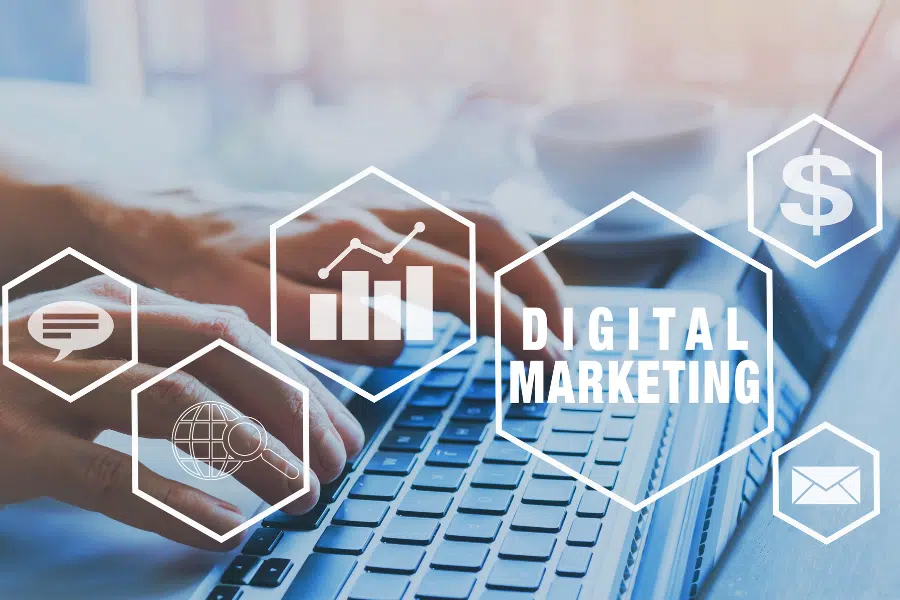
In the fast-paced digital landscape of today, paid advertising – also known as paid search – has emerged as a powerful accelerator for healthcare brands. The immense reach and targeting power of well-equipped platforms such as Google Ads and Facebook Ads makes this an effective tool for many industries, including healthcare.
Who Benefits from Healthcare Digital Advertising?
Healthcare providers and organizations can use digital marketing to fast-track audience reach, foster meaningful engagement, and disseminate vital information. Paid advertising on major platforms like Google may be the right fit for a healthcare company in such cases as:
- Establishing a patient base for new practices
- Recovery from patient attrition
- Keeping pace with competitors that gain patients through digital advertising, especially for local practices
- Target patients have distinct traits and are located in particular areas
- Modification of target demographics, budgets, and ad copy can be adjusted at management discretion
- The need for a digital marketing plan that doesn’t just say it will produce results, but can confirm that it is with solid reporting
The Top Paid Ad Opportunities for Healthcare
19.66 billion dollars is projected to be spent on healthcare digital advertising in 2024. So of course, all digital marketing channels are looking to get their piece of the pie. However, Google and Facebook digital advertising dominate as they have amassed the largest audiences and developed intelligent tools to “drill down” to specific audience parameters, benefiting the healthcare industry.
Google Digital Advertising for Healthcare
The power of the most used search engine on the planet is leveraged with paid advertising on Google. Billions of users get a free portal to virtually everything online while advertisers get access to those users based on specific search queries their target patients frequently make.
Google ads work well for healthcare as they can follow potential patients across various stages of intent, particularly when they are ready to schedule appointments. Paid search on Google allows your medical practice to get in front of those who are following a path toward receiving care by searching online for services.
Tip: Google advertising is a great choice when you want to promote specific events such as a healthcare class for the community or career fair.
Facebook Digital Advertising for Healthcare
Facebook may not be the first social media platform ever made, but it has surpassed most others when it comes to audience size and engagement levels. In exchange for keeping in touch with friends and family, and seeing amusing content, users are targeted for advertising.
Facebook users are typically passive. While the user may show patterns of interest in something, it isn’t necessarily active intent as it would be in a Google search. But keep in mind that with digital marketing, it usually takes several “touchpoints” before a healthcare consumer will make that first appointment, and Facebook ads drive that brand recognition process.
Differences in Ad Presentation: Google Vs. Facebook.
Compared to Google Ads, Facebook has more robust visual ad creation features. This can be especially useful for healthcare providers who need to be more demonstrative in communications with potential patients. By leveraging the visual impact of the Facebook platform, you build interest in your healthcare brand.
Tip: To build awareness of your healthcare brand – whether starting out as a new practice or revamping your image – Facebook advertising is effective at getting the word out to your market territories.
Where Should a Healthcare Company Advertise?
While it may seem easier to mirror what similar organizations are doing online, the best approach to choosing the right digital marketing channel is to first do market research. The more granular you can be about who your audience is, the better you can decide which to carve out a budget for in your targeting efforts.
Through strategic analysis, you can determine which channel – Google or Facebook – is where you have a better opportunity to reach your target audience. Or you might be a healthcare company looking to market to other healthcare companies and in such case, LinkedIn is the right opportunity.
Why Paid Healthcare Ads Can Be Tricky
Just like your healthcare business, digital media companies want to provide quality services and avoid liability. Google’s core updates will sometimes adjust their guidelines for healthcare marketing on their platforms. So, not only do you need to avoid certain wording about treatment claims and medications, but you also need to cut some terms entirely in both your ads and on your website pages.
If your healthcare business does not comply with Google’s guidelines on what can be stated, you risk having your ads campaigns stopped or your account disabled. This can stop your healthcare digital advertising momentum in its tracks.
The Blueprint for Successful Digital Ad Campaigns for Healthcare Companies
While anyone can create a Google or Facebook business account to build ads on these user-friendly platforms, it requires time, advanced techniques, and experience to run cost-effective campaigns.
Healthcare digital marketers are your co-pilots in steering your paid advertising in the right direction with audience targeting, platform troubleshooting, and a strategic approach based on business goals. Here are the general steps it takes to plan and execute healthcare digital advertising.
Set Goals for the Digital Ad Campaign
Before spending a penny on digital ads, have a specific goal in mind. What kind of patient is most likely to request, schedule and complete an appointment, and how can they best be reached? The more detailed you can be with your goals and the specifics of your potential patient targets, the better directed your efforts will be.
Set a Budget
Determine what your practice can afford and throttle spending accordingly. Because it is pay-per-click (PPC) – meaning you pay every time a person clicks your ad – costs can quickly add up when limits are not set ahead of time.
Create the Ad Accounts
Once you determine what media channels will best reach your target audience, get your accounts set up, and familiarize yourself with all the features. Of course, your healthcare digital marketing services provider can assist in setting everything up correctly.
Do Keyword Research
What are your ideal patients searching for? With Google Ads, you can research which keywords are popular in healthcare digital advertising, but also most relevant to your target audience. This is also the time to “shop” for keywords as some cost more “per click” than others. You can get more mileage for your ad spend if you can assemble a set of target keywords that are moderately priced.
Create the Ads
When it comes to publishing ads, Google makes it easy. However, you need to be intentional in what goes into the ad copy. Does it clearly convey what your practice is, what you are offering, and why you are different from the rest? Remember, there will likely be competing ads immediately adjacent to yours, using enticing language. It’s all about crafting an ad that will get those clicks.
As for Facebook, advertisers like your practice get a dynamic platform that allows them to choose from many different visual templates, some interactive. Choose a winning image or video, then dress it with some compelling copy and let it work its magic with your social media audience.
Create Your Landing Page(s)
A well-written landing page serves as a smooth transition from the ad encounter to your website. When a patient clicks an ad, they should come to a landing page rather than your home page. Think of your digital ads as the bridge that leads the patient to the final steps of the “conversion” process. What the ad says gets the click, but what the landing page contains pushes the patient acquisition process along, telling the patient what to do next and why. H3: Refine Your Market Targeting
Most advertising platforms also allow you to target different demographics such as age, income levels, and life events like becoming a parent. Set your specifications according to the patients you want to target, particularly those who are more likely to receive your more profitable services.
Be Prepared for Prompt Response to Inquiries
To have potential patient leads coming in, but no one to respond to them, will result in a waste of marketing spend. When receiving electronic form submissions, phone calls or voicemails, be prompt in helping patients take the next step, like booking that initial appointment.
Monitor Results and Make Improvements
It takes between three and five months to get an accurate picture of your healthcare digital advertising campaign performance. When you analyze performance, look for the number of impressions, clicks, and check it against your conversion numbers (how many patients connected with your practice through clicking an ad and how many showed for an appointment).
Summary of Success in Marketing Strategies for Healthcare
Paid advertising platforms such as Google Ads and Facebook Ads are powerful tools for healthcare companies to quickly reach their target audience, foster engagement, and disseminate vital information.
But advertising is a substantial expense, and to ensure that it is a worthwhile investment, healthcare companies should take the time to understand how digital ads work, be precise in who they want to target, and determine the best avenues to reach them.
Working with an experienced healthcare marketing agency that will manage all the moving parts of paid ads ensures that your advertising dollars are well spent. Paid advertising can feel like you are trying to solve a Rubik’s cube, but with the right experts at your side, you can be precise in planning all the aspects of a campaign plan, and troubleshooting when results are not where they should be.
Leverage iHealthSpot’s Healthcare Digital Marketing Expertise to Get More for Your Advertising Dollars
With its ability to target specific demographics, interests, and behaviors, digital advertising provides a direct and efficient means to attract and engage patients who need your services. To respond to a market that is becoming increasingly competitive and digitally driven, today’s healthcare company may need to add digital advertising to its business strategy.
iHealthSpot is committed to digital marketing excellence. Our agency is a Google Certified Partner, and our team of experts uses strategic data insights to keep campaigns finely tuned and stay on top of changes within the landscape. Learn more about our robust healthcare pay-per-click services.








